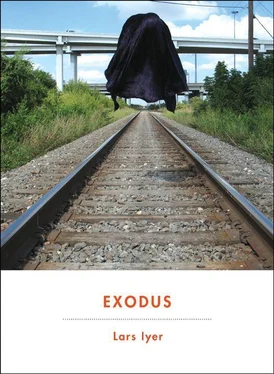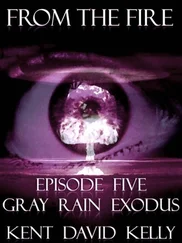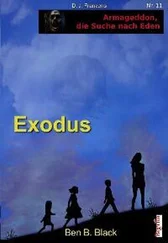I confuse his thinking friends, W. says. Of course, they know at once I’m not a fellow thinker, a fellow thought-adventurer. For a moment — and for no more than that, since such thinkers have other things to reflect upon — they wonder whether I am not to W. as W. is to them — a kind of slow-witted brother, a cousin and fellow, one who needs encouragement, bringing on …
That’s why they smile at me, despite everything, W. says. It’s why they make some semblance of including me in their conversations, turning to me as though I could understand what they were saying, as though I were capable of following their accounts of their struggles with thought.
It’s why they speak to me of the shrivelling of thought, when thought contracts like a pair of testicles in the cold, W. says. It’s why they speak to me of thought’s bolting , when thought branches wildly, uncontrollably, far beyond anything you could control. It’s why they speak to me of cancers of thought, when thought is hollowed out from within, by doubts and unconfidence; and of locusts of thought, when thought is devoured from without, by illness and misfortune, poverty and abuse.
It’s why they speak to me of the fear of madness , of opening their minds too wide. That’s the thing they all fear, W. says. That’s the terror of the real thinker.
W.’s Middlesex friends are on the margins of the philosophy department, he says. They’re research fellows, kept on contracts, never knowing whether they’ll be renewed, never knowing whether they’ll have a job next year.
They speak with irony of the misery of their working conditions. Of precarity and underemployment. Of the loneliness of the long distance postdoctoral researcher.
But they still smile, W. says. They have their studies, after all. They have their thought-paths. They know their brilliance , W. says. They feel it throbbing in their temples.
What conversations he’s had with his Middlesex friends! W. says. What late-night dialogues! They’re so young! They’re full of burning thoughts! Blazing thoughts! Philosophy is on fire inside them!
W.’s Middlesex friends remind him of the young in Robert Bresson’s films, full of life, full of beauty, but hopelessly lost in the devil’s playground that is the world. They remind him of the young suicides of Bresson’s films, driven to death because there is nothing for them in life, choosing to die by their own hand rather than live hypocritically.
They die of the truth , Bresson’s young people, W. says. They die because of what they see in themselves of the world. They die because of their sense of the corruption of their innocence, because they are angels and because they are tarnished, W. says.
Haven’t the Middlesex researchers confessed to W. of their terrible melancholias, of disorders of the spirit that their effort to think has only driven deeper? Hasn’t he had to pull them back from the brink?
We must be tireless in our support of real thinkers, W. says. We must never close our eyes. The real thinker is close to death, close to suicide. The real thinker is subject to impersonal agonies, to interstellar tortures. They real thinker has set out alone to the heart of thought’s continent, all the way to the pole. And some have even returned from that pole, their hair streaked with frost, their tears frozen on their cheeks. They’ve seen the broken ice of the Arctic of thought and the crevassed plains of the Ant arctic of thought.
Thoughts should shatter the frozen sea within us, that’s what Kafka wrote, W. says. And that’s what he’s seen in the eyes of his Middlesex friends: a shattering. The fact that a shattering has occurred with tremendous force. That the landscape of thought has been broken and reassembled. That it has heaved upwards in a kind of earthquake, and crashed back down again, changed in its every detail in a way only a true thinker could understand.
What do you think his Middlesex friends see when they see us, with our permanent jobs? W. asks. What, when we stand before them, with our lectureships and our indolence? Compromise : that’s what they see. Bourgeois philosophy!..
The Middlesex researchers will find us wanting, we who have grown fat in our university jobs, W. says. They’ll see that our ideas are only middle class ideas, and that our despair is only a remembered despair, a sham despair.
Middlesex campus. How many times have we wandered through a university in which we’re about to give a presentation, dread mounting inside us like bile? How many times have we walked like men condemned, vowing that this time it will be different; that this time it will all come right?
Coffee! We need coffee! Coffee will make us able to think more keenly; one espresso, another, and it will all become clear. A third cup, and we’ll swell with self-belief. A fourth, and we’ll be certain that our thought is of world-historical significance. Epochal significance!
But they only serve instant coffee on campus, and no revelation comes no matter how many cups we drink.
We were altogether too pathetic for our Middlesex audience, W. says, on the train back to the city. Our vague communism. Our messianic pathos : what need had they for that?
My beard didn’t fool them, W. says. Nor did his half-beard. They were looking for something else. Something tougher. They didn’t want to hear about exilic themes in the work of Marx. They were uninterested from the first in Marx’s messianism .
W. opened his notebook, and read aloud:
The present generation is like the Jews whom Moses led through the wilderness. It has not only a new world to conquer, it must go under in order to make room for men who are able to cope with a new world .
‘That’s Marx’, he told our listeners. And then, ‘The reference is to the book of Exodus , of course’. Hostility from our audience. They were unimpressed. This is no time for religion! said their folded arms. Less pathos, more precision! said their pursed lips. The banks are collapsing, and this is what you have to tell us? said their filed-sharp teeth.
Moses and his people left Egypt, where they were slaves, and, in obedience to God’s call, headed into the desert in search of the promised land, W. said. The desert: who would go there? he continued. The ‘ great and terrible wilderness ’, the Bible calls it, with no grass for pasture, where thirst and starvation would drive you mad. A wasteland, a damned place, the refuge of the devil: who would heed Moses’ call for exodus? W. asked.
But heed it they did, hundreds of thousands of them, pursued by the chariots of the Pharaoh, W. said. Go they did, with God amongst them, for wasn’t God, too, a pilgrim with the children of Israel?
Then I took the baton. For forty years they wandered, I said. It was forty years before they reached Canaan. Why so long? I asked rhetorically. Because they had to rid themselves of the memory of captivity, the memory of Egypt, I answered. Because a generation had to be born and raised who knew nothing of slavery.
Then W. again. The young: everything, for Moses, depended on them, he said. The young were the fruit of the years of tribulation. It was the same for Marx, for whom the proletariat was always young, fiercely young. But until then? W. asked rhetorically. Until the proletariat came who had no memory of their slavery and of the land of their captivity? Wandering, W. said. Endless wandering.
The Talmud tells us that it is forbidden to grow old, W. said. He was thinking of our young audience at this point, he says. Of the Middlesex researchers, sitting around us in a semicircle, with a dagger in their hearts, and ice on their lips. W. was dreaming of those to come after us, after our going under , he says.
Читать дальше












